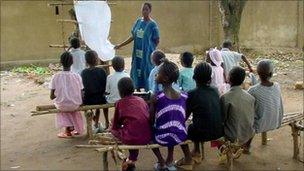MPs 'concerned' over UK Africa aid spending
- Published

The UK has donated £1bn to help improve education in Africa and Asia
A cross-party committee of MPs has said it has concerns about the way the UK is spending education aid money in Africa.
The House of Commons Public Accounts Committee also said it was unsure that the government was getting value for money from its aid programme.
And its report said it was worried that £1bn of UK funds given to improve primary education in Africa and Asia were among donations involved in fraud.
The government said the report showed failures by the Labour government.
The committee's report said it was "extremely concerned" that taxpayers' money had been tied up in a series of frauds uncovered in the main education project supported by the British government in Kenya.
The risk of fraud occurring had been misjudged by the Department for International Development (DFID), said the report.
And the committee said the department had "no coherent framework" to measure whether the UK aid expenditure made any difference to school attendance or pupils' achievements.
'Selective examples'
DFID has focused on educational programmes to improve and expand state primary school networks in 22 countries in sub-Saharan Africa and Asia.
Most have increased school enrolment from 50% - or even lower - to 70%-90% and 14 are on schedule to meet UN Millennium Development Goals on education by 2015.

Andrew Mitchell said the government aimed to get maximum value for overseas aid
While the report welcomed DFID's aims and the progress made, it said: "We have significant concerns about its ability to assess the value for money of its spending."
The MPs said it was "unacceptable" that DFID seemed willing to use "selective examples and anecdotes" to demonstrate spending effectiveness.
"We were unconvinced that growth in enrolment would not have occurred without the department's investment," said the report.
The committee also found that more than 50% of the growth in Kenyan school attendance came in private schools, which were not supported by funding from DFID.
The MPs welcomed DFID's decision to appoint a director of value for money, Liz Ditchburn, but said that until new measures to gauge effectiveness of the spending were introduced, "we can have little confidence that UK taxpayers' money is securing the fullest benefits for poor people overseas".
Cash recovered
The report also gave a warning of a "serious stretch" of DFID's network of 34 education advisers, as only 20 of whom are based overseas.
DFID has said it accepted it must learn lessons from the fraud uncovered in Kenya, although Ms Ditchburn said that its £120,000 losses incurred in that country had been recovered from the Nairobi government.
The International Development Secretary Andrew Mitchell said the report had revealed the failures of the previous government, which coalition ministers were sorting out.
He also said ministers were determined to get maximum value for money from overseas aid.
The previous Labour administration committed the UK to spending at least £1bn annually on education aid from 2010/11.
DFID is the only area outside the NHS in England to escape the cuts being made by the coalition government, which has promised to increase DFID spending from £7.8bn to £11.5bn by 2014/15.
Its budget will increase by a third over the lifetime of this parliament.
- Published18 June 2010